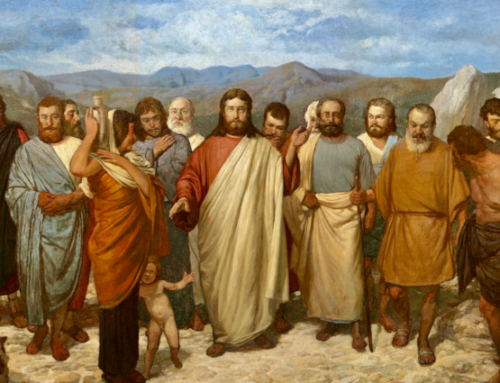The quest for tranquility is not found in a world of frenetic intemperance and agitated markets. Tranquility is an interior movement that presupposes a soul at peace. Wisdom is the virtue of seeking the highest cause of things. Only a society that facilitates wisdom can provide peace and order.
Marketers typically create excitement around a product to get people to buy the item and the experience associated with it. The greater the hype, the more likely the consumer will get it. Excitement equals profits. Perceived loss translates into a desire to buy. High emotions often trump actual need.
However, a new niche market relies on a contrary logic. Its target audience is those who are stressed-out. These consumers do not want excitement or hype. They want peace, warmth and affection. This sector grew enormously during the Covid crisis as anxiety increased in all age and demographic categories.
Companies are adjusting to the trend by making products that soothe anxieties. The goal is not to excite but to tranquilize worried buyers. Makers of cars, cereals, beverages and many everyday products are designing products that contain reassuring messages. In these cases, calm equals opportunities.
The Car as Sanctuary
The Wall Street Journal, for example, reports that the new Lincoln Nautilus is marketed as “a sanctuary” from the frenetic world outside. Once inside the vehicle, the person finds seats that offer massages. Vents circulate refreshed air while sound-absorbing materials keep out noise. Obnoxious car alarms and reminders are replaced by soft chimes composed and played by the Detroit Symphony Orchestra. The company claimed entrance into the car sanctuary “feels like a human hug.”
The reason for the change of focus is the soaring stress levels made worse by the Covid crisis. A June survey by the Centers for Disease Control and Prevention reported that nearly one-third of Americans are presently experiencing depression and anxiety. In 2019, only eleven percent suffered such symptoms. The dramatic change has caught the attention of marketers who began addressing the mental well-being crisis and producing mini-sanctuaries for stressed-out souls.
The Quest for the Stress-Free
Thus, people want products that promise to make them feel better. The problem is that “feeling better” is hard to quantify, and stress-relief claims are not easy to prove scientifically. Most consumers have to settle for perception or calming imagery to convey the idea of well-being. There is no guarantee that well-being will happen.
Young adults particularly feel freer to express their mental-health problems than past generations. The market is responding with a widening range of products to address these massive needs.
And companies are doing this frenetically. Ironically, they seek to profit from this quest of the stress-less with frantic energy and drive. They are rapidly rolling out products that convey the image of soothing calm. Marketers come up with seductive product names that promise anxiety relief.
The Covid crisis added another layer of uncertainty that creates a demand for structure and even ritual.
Drinks that Relax the Mind
One area of this market’s expansion is drinks and teas. Companies are finding that while some consumers want energy drinks, others need beverages to wind down.
Thus, PepsiCo launched a drink called Driftwell to relax the mind with water laced with blackberry and lavender flavors. The image of drifting off to sleep is deliberate to cater to agitated consumers that find it difficult. The company also introduced another product, Soulboost, a sparkling water brand that brings solace and relaxation to battered souls.
Coca-Cola introduced a “tranquility” line of its smartwater bottled water, infused with ashwagandha and tangerine extract, which it claims to aid in decompressing. Other companies offer “serenity” blend teas promising to relieve stress. The more exotic the ingredient, the more likely it is to conjure up images of ancient folk remedies.
A Desire for More Structure and Ritual
Other products involve more complex and structured activities as a means of overcoming stress.
A nursery product company, Miracle-Gro Co. of Columbus, Ohio, introduced a new brand of houseplants called Greendigs after market research uncovered the therapeutic value of caring for plants. The new plants are now called stress reducers since caring for plants was deemed “ritual behavior that created comfort.” Nurturing something living has the effect of reducing anxiety.
Another example of more structured products is 3M’s new line of Post-it notes called “Noted by Post-it.” The new product structures the notes to allow for journaling, habit-tracking and inspirational sayings. The notes come with coordinated pens and notebooks that help the person get rid of anxiety by organizing and structuring their lives. These notes are not blank but come with boxes for users to list their priorities and plan their days.
True Peace is Not Found in Agitated Markets
The quest for tranquility is not found in a world of frenetic intemperance and agitated markets. Tranquility is an interior movement that presupposes a soul at peace. People can surround themselves with exterior things laden with peace-invoking names or soothing imagery. However, they will never obtain true peace in this way.
According to philosopher Josef Pieper, peace comes from the contemplative act whereby people understand the meaningfulness of the universe and their purpose within it. Because the mind is ordained to the knowledge of the first causes of things, it experiences peace and wonder by contemplating the marvels of Creation and the Creator. The soul experiences peace when in sync with the order of the universe through the practice of virtue.
“’To know the highest cause,’ then, does not mean to know the cause of some particular thing,” Dr. Pieper says, “but to know the cause of everything and of all things: it means to know the ‘whither’ and the ‘whence,’ the origin and the end, the plan and the structure, the framework and the meaning of reality.”
Wisdom is the virtue of seeking the highest cause of things. Only a society that facilitates wisdom can provide peace and order. Anything else is window dressing and fancy packaging.
The Imaginative Conservative applies the principle of appreciation to the discussion of culture and politics—we approach dialogue with magnanimity rather than with mere civility. Will you help us remain a refreshing oasis in the increasingly contentious arena of modern discourse? Please consider donating now.
The featured image, uploaded by ParadiseAnimation, is licensed under the Creative Commons Attribution-Share Alike 4.0 International license, courtesy of Wikimedia Commons.








Thank you, John
Very insightful, thank you!
The first step would be to stop referring to people as consumers. Or, perhaps it is the “consumer” who desires agitation and people known by some other term who seek peace.
In a word, if there is a profit to be made, whether caused by misery, loss, violence, irrationality, stupidity, and lust for power, the profiteers will find a way. A niece just bought a set of rings that “spin” which is supposed to help her when she is feeling anxious. I say, stop wasting your money. Pray, meditate on the life, death, and resurrection of Jesus and this is a free and more importantly, a true path to learning wisdom.
” Wisdom is the virtue of seeking the highest cause of things”. By whose definition.? The problem is that the ” wise” can’t agree on an answer as to what is the ” highest cause
( perhaps ” ultimate cause ” is more neutral) . Or even if an ” ultimate cause ” exists.
I ride my bike in the upstate NY countryside.
Just today, a majestic landscape gave me pause – this scene is only a glimmer of the beauty of its Creator!
It keeps me going.